Design decisions for buildings and communities are critical to efforts to increase local and regional resiliency. Building designers — of residential, institutional, and commercial structures — should strive to incorporate passive and active survivability concepts into new and renovated structures.
Community planners and developers need to incorporate concepts that increase the capacity to maintain transportation flow, strategies to handle water management, and infrastructure approaches that will withstand a variety of risks.
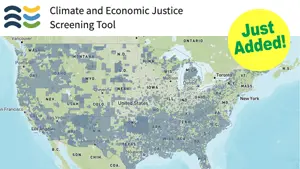
Climate and Economic Justice Screening Tool
The Climate and Economic Justice Screening Tool from the Council on Environmental Quality features an interactive map and uses datasets that are indicators of burdens in eight categories: climate change, energy, health, housing, legacy pollution, transportation, water and wastewater, and workforce development.
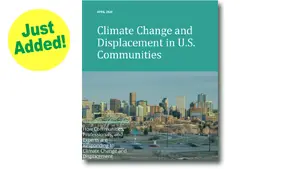
Climate Change and Displacement in U.S. Communities
EcoAdapt conducted a survey with the Strong, Prosperous, and Resilient Communities Challenge to determine if and how people working to address displacement pressures are considering the effects of climate change. This survey is part of a broader project in collaboration with the Urban Displacement Project to better understand the intersections between climate change and displacement pressures.
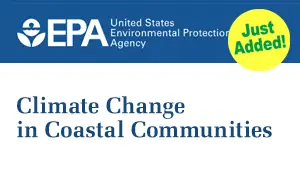
Climate Change in Coastal Communities
US EPA maintains a website that focuses on essential information for coastal communities planning for the effects of climate change.
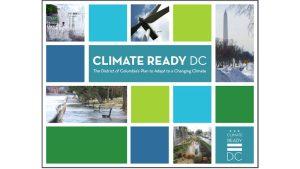
Climate Ready DC: The District of Columbia’s Plan to Adapt to a Changing Climate
Climate Ready DC is the District of Columbia’s strategy to make the District more resilient to future climate change while helping to ensure that our city continues to grow greener, healthier, and more livable.
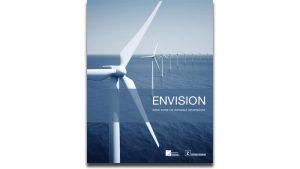
Envision Rating System for Sustainable Infrastructure
Published in 2015, the Envision system is composed of tools, covering all aspects of a product’s lifecycle, that are meant to introduce sustainability into infrastructure projects.
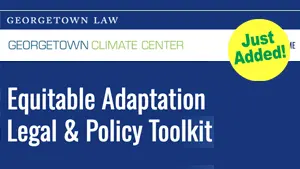
Equitable Adaptation Legal & Policy Toolkit
The Georgetown Climate Center maintains the Equitable Adaptation Legal & Policy Toolkit, which highlights best and emerging practice examples of how cities are addressing disproportionate socioeconomic risk to climate impacts and engaging overburdened communities.
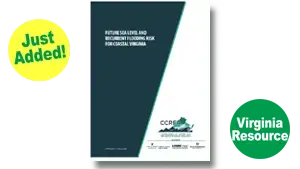
Future Sea Level and Recurrent Flooding Risk for Coastal Virginia
The report presents analysis of the best available existing data on coastal land elevation, sea level rise projections, vertical land motion (subsidence), and building and transportation assets.
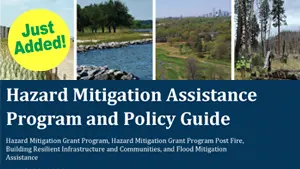
Hazard Mitigation Grant Program (HMGP)
FEMA’s Hazard Mitigation Grant Program provides funding to state, local, tribal and territorial governments so they can develop hazard mitigation plans and rebuild in a way that reduces, or mitigates, future disaster losses in their communities.
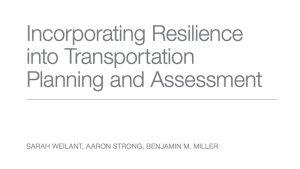
Incorporating Resilience Into Transportation Planning and Assessment
In this report, RAND researchers outline a conceptual framework to incorporate resilience into transportation planning.
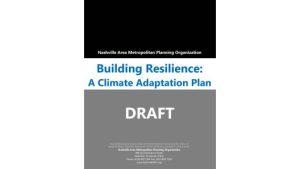
Nashville MPO’s Building Resilience: A Climate Adaptation Plan
This plan was developed by representatives of Nashville Metropolitan Organization (Nashville and surrounding counties) in collaboration with Climate Solutions University (CSU), the Cumberland River Compact, and the Model Forest Policy Program.

Climate and Economic Justice Screening Tool
The Climate and Economic Justice Screening Tool from the Council on Environmental Quality features an interactive map and uses datasets that are indicators of burdens in eight categories: climate change, energy, health, housing, legacy pollution, transportation, water and wastewater, and workforce development.

Climate Change and Displacement in U.S. Communities
EcoAdapt conducted a survey with the Strong, Prosperous, and Resilient Communities Challenge to determine if and how people working to address displacement pressures are considering the effects of climate change. This survey is part of a broader project in collaboration with the Urban Displacement Project to better understand the intersections between climate change and displacement pressures.

Climate Change in Coastal Communities
US EPA maintains a website that focuses on essential information for coastal communities planning for the effects of climate change.

Climate Ready DC: The District of Columbia’s Plan to Adapt to a Changing Climate
Climate Ready DC is the District of Columbia’s strategy to make the District more resilient to future climate change while helping to ensure that our city continues to grow greener, healthier, and more livable.

Envision Rating System for Sustainable Infrastructure
Published in 2015, the Envision system is composed of tools, covering all aspects of a product’s lifecycle, that are meant to introduce sustainability into infrastructure projects.

Equitable Adaptation Legal & Policy Toolkit
The Georgetown Climate Center maintains the Equitable Adaptation Legal & Policy Toolkit, which highlights best and emerging practice examples of how cities are addressing disproportionate socioeconomic risk to climate impacts and engaging overburdened communities.

Future Sea Level and Recurrent Flooding Risk for Coastal Virginia
The report presents analysis of the best available existing data on coastal land elevation, sea level rise projections, vertical land motion (subsidence), and building and transportation assets.

Hazard Mitigation Grant Program (HMGP)
FEMA’s Hazard Mitigation Grant Program provides funding to state, local, tribal and territorial governments so they can develop hazard mitigation plans and rebuild in a way that reduces, or mitigates, future disaster losses in their communities.

Incorporating Resilience Into Transportation Planning and Assessment
In this report, RAND researchers outline a conceptual framework to incorporate resilience into transportation planning.

Nashville MPO’s Building Resilience: A Climate Adaptation Plan
This plan was developed by representatives of Nashville Metropolitan Organization (Nashville and surrounding counties) in collaboration with Climate Solutions University (CSU), the Cumberland River Compact, and the Model Forest Policy Program.
